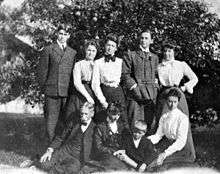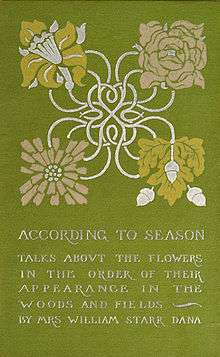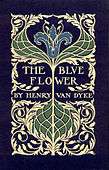Margaret Neilson Armstrong
Margaret Neilson Armstrong (1867–1944) was a 20th-century American designer, illustrator, and author. She is best known for her book covers in the Art Nouveau style. She also wrote and illustrated the first comprehensive guide to wildflowers of the American west, Field Book of Western Wild Flowers (1915). In later life she wrote mystery novels and biographies.
Margaret Neilson Armstrong | |
|---|---|
 The Armstrong family c. 1910s. Front row, left to right, Maitland, Helen, Ham, and Margaret Neilson Armstrong. | |
| Born | September 24, 1867 New York, New York, United States |
| Died | July 18, 1944 (aged 76) New York, New York, United States |
| Nationality | American |
| Occupation | Author Illustrator Book cover designer |
| Years active | 1890-1941 |
| Known for | American trade binding designs |


Life
Margaret Neilson Armstrong was born on September 24, 1867, in New York City, the daughter of American diplomat and stained glass artist Maitland Armstrong and his wife Helen, who was a descendant of Peter Stuyvesant and a niece of Hamilton Fish.[1][2] Her six siblings included Helen Maitland Armstrong (1869–1948), who followed in her father's footsteps to become a stained glass artist, and Hamilton Fish Armstrong, a magazine editor.
She began her career as a designer in the 1880s, working initially for A.C. McClurg and later for other publishers as well.[3] She designed more than 270 book covers and book bindings, about half of which were for Scribner's.[4] She worked in the Art Nouveau style and favored plant-related motifs, bold colors, gold stamping, and often slightly asymmetrical designs—an unusual combination that helped to distinguish her among her peers.[1][3] Authors for whom she designed several covers include Frances Hodgson Burnett, Florence L. Barclay, George Washington Cable, Charles Dickens, Paul Laurence Dunbar, Robert Louis Stevenson, Henry van Dyke, and Myrtle Reed.[3] She has been called "the most productive and accomplished American book designer of the 1890s and early 1900s", and her work is often compared to that of her contemporary Alice Cordelia Morse.[2]
Her monogram appears on many covers after 1895; it is a simple 'MA' in upper case with the 'M' slightly overlapping the 'A'.[4]
Armstrong cut back on book cover design around 1913 as dust jackets began to come into fashion and turned to writing her own books. (Her signature style was so successful, however, that publishers then hired artists specifically to imitate her look.)[3]
An avid naturalist, Armstrong's passion for natural forms reflected her interest in botany and in particular, in wildflowers. During the 1911-1914 period, she traveled and camped throughout the Western United States and Canada, becoming one of the first women to reach the bottom of the Grand Canyon. She discovered there several species of flowers that had not yet been identified by botanists.[5] She details those and many other species in her Field Book of Western Wild Flowers (1915). With its 550 illustrations (48 of which were in color), her Field Book is considered the first comprehensive guide on the subject.[1]In her sixties and seventies, she wrote three critically praised mystery novels—Murder in Stained Glass (1939), The Man with No Face (1940), and The Blue Santo Murder Mystery (1941)—and two biographies, Fanny Kemble: A Passionate Victorian (1938) and Trelawny: A Man's Life (1940). She also completed her father's memoirs.
She died in New York City in 1944.[6]
Her work is represented in the Metropolitan Museum of Art's collections[7] and the collections of the New York Botanical Garden.[8][9]
Books
- Field Book of Western Wild Flowers (1915)
- Five Generations (1930)
- Fanny Kemble: A Passionate Victorian (1938)
- Murder in Stained Glass (1939)
- Trelawny: A Man's Life (1940)
- The Man With No Face (1940)
- The Blue Santo Murder Mystery (1941)
 Mary Raymond Shipman Andrews, The Militants, 1907.
Mary Raymond Shipman Andrews, The Militants, 1907. Elisabeth Luther Cary, The Rossettis, 1900.
Elisabeth Luther Cary, The Rossettis, 1900. Henry van Dyke, The Blue Flower, 1904.
Henry van Dyke, The Blue Flower, 1904.
References
- Gullans, Charles, and John Espey. Margaret Armstrong and American Trade Bindings. Los Angeles: UCLA Library Department of Special Collections, 1991. https://archive.org/details/margaretarmstron00gull/
- Evans, Curtis. "Had I But Known Authors #2: Margaret Armstrong, HIBK Patrician". The Passing Tramp (blog), January 28, 2012.
- "Margaret Armstrong Decorated Bindings Collection"
- "Margaret Neilson Armstrong (1867–1944)". The University of Alabama. Retrieved 7 March 2015.
- Gullans, Charles B; Espey, John Jenkins; University of California, Los Angeles; Library; Department of Special Collections; Margaret Armstrong Binding Collection (Library of Congress) (1991-01-01). Margaret Armstrong and American trade bindings: with a checklist of her designed bindings and covers. Los Angeles: Department of Special Collections, University Research Library, University of California. p. 51. OCLC 704904397.
- Martin, Crista. "Armstrong, Margaret Neilson (1867–1944)." Women in World History: A Biographical Encyclopedia. Ed. Anne Commire. Vol. 1. Detroit: Yorkin Publications, 2002. 483. Gale Virtual Reference Library. Web. 7 March 2015.
- "Pride of California, Lathyrus Splendens". The Metropolitan Museum of Art. Retrieved 7 March 2015.
- The New York Botanical Garden. "#HerNaturalHistory Facebook Live". Facebook. Retrieved 18 March 2019.
- Jackson, Esther (29 March 2019). "The Life & Works of Margaret Neilson Armstrong". Plant Talk. Retrieved 9 April 2019.
External links
| Wikimedia Commons has media related to Margaret Neilson Armstrong. |
- Works by Margaret Neilson Armstrong at Project Gutenberg
- "Margaret Armstrong". University of Rochester. Archived from the original on August 10, 2007. Retrieved August 10, 2007.
- Margaret Armstrong Binding Collection The Rare Book and Special Collection Division at the Library of Congress
- "Margaret Armstrong Decorated Bindings Collection"
- Miriam Irwin Collection of Margaret Armstrong Book Design
- Gullens, et al. Margaret Armstrong and American Trade Bindings: with a checklist of her designed bindings and covers, 1991. (Archive.org)
- New York Botanic Garden broadcast 19.30 min onwards 12 March 2019